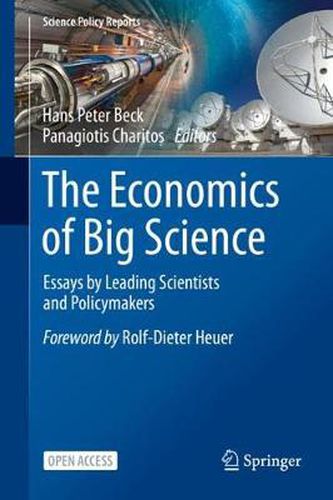Readings Newsletter
Become a Readings Member to make your shopping experience even easier.
Sign in or sign up for free!
You’re not far away from qualifying for FREE standard shipping within Australia
You’ve qualified for FREE standard shipping within Australia
The cart is loading…






This title is printed to order. This book may have been self-published. If so, we cannot guarantee the quality of the content. In the main most books will have gone through the editing process however some may not. We therefore suggest that you be aware of this before ordering this book. If in doubt check either the author or publisher’s details as we are unable to accept any returns unless they are faulty. Please contact us if you have any questions.
The essays in this open access volume identify the key ingredients for success in capitalizing on public investments in scientific projects and the development of large-scale research infrastructures.
Investment in science - whether in education and training or through public funding for developing new research tools and technologies - is a crucial priority. Authors from big research laboratories/organizations, funding agencies and academia discuss how investing in science can produce societal benefits as well as identifying future challenges for scientists and policy makers. The volume cites different ways to assess the socio-economic impact of Research Infrastructures and their role as hubs of global collaboration, creativity and innovation. It highlights the different benefits stemming from fundamental research at the local, national and global level, while also inviting us to rethink the notion of benefit in the 21st century.
Public investment is required to maintain the pace of technological and scientific advancements over the next decades. Far from advocating a radical transformation and massive expansion in funding, the authors suggest ways for maintaining a strong foundation of science and research to ensure that we continue to benefit from the outputs. The volume draws inspiration from the first Economics of Big Science workshop, held in Brussels in 2019 with the aim of creating a new space for dialogue and interaction between representatives of Big Science organizations, policy makers and academia. It aspires to provide useful reading for policy makers, scientists and students of science, who are increasingly called upon to explain the value of fundamental research and adopt the language and logic of economics when engaging in policy discussions.
$9.00 standard shipping within Australia
FREE standard shipping within Australia for orders over $100.00
Express & International shipping calculated at checkout
This title is printed to order. This book may have been self-published. If so, we cannot guarantee the quality of the content. In the main most books will have gone through the editing process however some may not. We therefore suggest that you be aware of this before ordering this book. If in doubt check either the author or publisher’s details as we are unable to accept any returns unless they are faulty. Please contact us if you have any questions.
The essays in this open access volume identify the key ingredients for success in capitalizing on public investments in scientific projects and the development of large-scale research infrastructures.
Investment in science - whether in education and training or through public funding for developing new research tools and technologies - is a crucial priority. Authors from big research laboratories/organizations, funding agencies and academia discuss how investing in science can produce societal benefits as well as identifying future challenges for scientists and policy makers. The volume cites different ways to assess the socio-economic impact of Research Infrastructures and their role as hubs of global collaboration, creativity and innovation. It highlights the different benefits stemming from fundamental research at the local, national and global level, while also inviting us to rethink the notion of benefit in the 21st century.
Public investment is required to maintain the pace of technological and scientific advancements over the next decades. Far from advocating a radical transformation and massive expansion in funding, the authors suggest ways for maintaining a strong foundation of science and research to ensure that we continue to benefit from the outputs. The volume draws inspiration from the first Economics of Big Science workshop, held in Brussels in 2019 with the aim of creating a new space for dialogue and interaction between representatives of Big Science organizations, policy makers and academia. It aspires to provide useful reading for policy makers, scientists and students of science, who are increasingly called upon to explain the value of fundamental research and adopt the language and logic of economics when engaging in policy discussions.